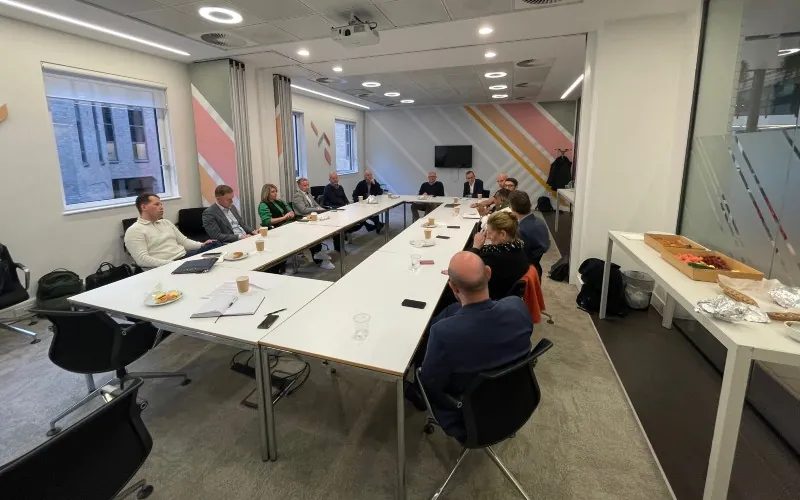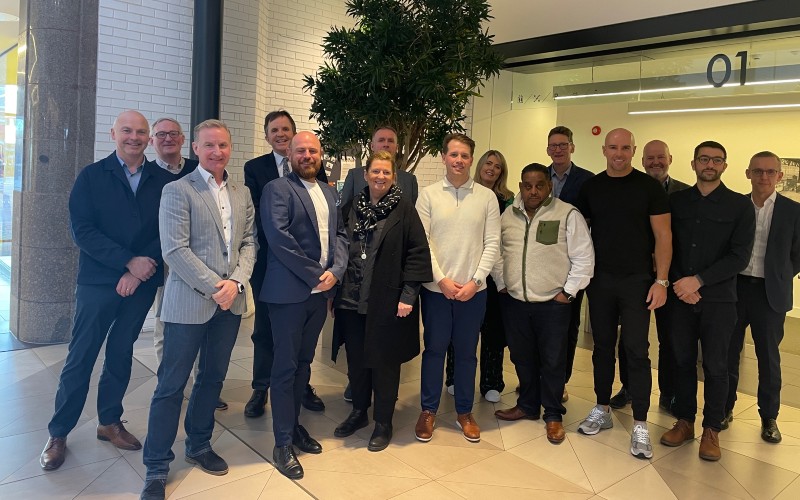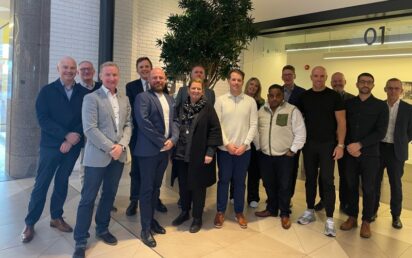Planning and timing are critical for a successful business exit.
They were among the findings of a roundtable discussion held by leading advisory firm MHA Moore & Smalley and 12 businesses from Liverpool City Region.
The discussion was hosted in Exchange Station in Liverpool by Chris Maguire, executive editor of TechBlast and BusinessCloud.
De-risking
Daniel Reilly is the founder of Ruler Analytics, which uses data to track customer journeys.
He said: “Give yourself more than one ticket in the raffle. Sometimes you can focus on that ultimate capital event being the thing that all of your life’s work, works up to.
“Along that journey you can take some off the table if you have a healthy business. You can de-risk your position in a correct way.
“It seems like we’ve all got this US model now where we build the business really quick, sell the business really quick and that’s success. There are other businesses that are eighth generation. You can do it in more than one way.
“That makes the decision around the exit easier if you’ve already done things correctly along the way.”
Understand the multiples
Alex Moretti is the CEO of independent developers Fallen Planet Studios, which raised £500,000 from fund:AI, managed by Liverpool-based River Capital.
He advised: “Work back from your exit plan and understand what those exit multiples would be in your own industry and what kind of shareholding you still want to have when you get to that point. Bringing in governance and asking for help is also really important.”
Distracted
Anna Heyes is the CEO of marketing and PR agency Active Profile and said that leaders could often be distracted from thinking about succession planning.
She said: “You can be diverted because we are still growing businesses. Ultimately, we’ve got to be bringing those revenues in.
“That can sometimes leave us on the back foot when it comes to the types of discussions we’re having today and creating the space that we need to be able to think about these things. I’ve been a bit guilty of that in the past.”
Staying on the bus
Michael Darracott is the managing director of geospatial tech firm MGISS, which uses surveying and space technology to help utility and infrastructure companies find buried assets.
He said: “We were a VC-backed business from the start. They’re 10 years in. Their model is patient capital. It’s not all about a quick exit. They’re wanting to stay on the bus with us.
“The second observation is around the relay race. I’ve been thinking about that analogy and wanting to hand the baton on but the members in the relay race can change as well.
“You’ve always got to keep checking in and making sure you’ve got the right people at the right stage to get you over the line. Seeking advice at forums like this is really helpful.”
Exit is ‘boiled in’
Rob Rule is the founder and CEO of BioTech startup Entropix, which is an early-stage enzyme development company.
As a VC-backed business, he said an exit was ‘boiled into’ their investment model.
He explained: “Obviously a company like ours, early stage, raising VC, that implies that you need an exit because your investors need an exit.
“It’s a different scenario to some of the other businesses around the table and some of the businesses I’ve worked at in the past as well.”
Options
Rob Richardson is a partner of MHA Moore & Smalley and said it was never too early to prepare for succession.
“Starting a business and growing a business is a hugely emotional journey for a lot of entrepreneurs,” he said. “It’s about being realistic that at some point you are going to have to exit.

“With that in mind it’s important to plan ahead and give yourself plenty of options. There are a huge amount of variables in there.
“If you’ve got the right team around you and you’ve got the right model, you’ve then got the options to be able to take some value or exit at a time that suits you.”
No-one is indispensable
Asif Hamid is the CEO and founder of The Contact Company, which is the largest privately-owned contact centre in the country with around 1,500 employees.
He had this advice for anyone planning an exit. “See what the industry sector is doing around you. Each sector is different so try and make sure you’re ahead of the game and find out who your competitors are. Try and measure the right time to get in. If you’re in it, you’ve got to get out.
“We all think we’re indispensable when we start a business off but the reality is we’re not. You’ve got to work out what you’re going to do after this. We’ll always find something else to do.”
Ask for help
Lorna Davidson is the CEO and founder of RedWigWam, which is turning the world of recruitment on its head.
She said when it comes to succession planning people shouldn’t be afraid to ask for help.
“What’s been really interesting today is the different businesses in different places,” she said.
“It’s great that everybody is thinking about it but we need to ask for help, ask for advice, hear what other people are doing. For me it’s about being brave and asking for help.”
Do good stuff
David Connor is the founder of 2030hub, which is on a mission to eliminate poverty and make economic growth inclusive and sustainable.
“If you’re going to sell a company think about what happens after that,” he said. “Don’t wait to be a philanthropist. Do all the good stuff while you’ve got the company and you’ve got the control.”
Have a realistic valuation
Alan Riddoch is the managing director of Agility Communications, which merged with The Mailing Room in 2022.
He said: “Set a time scale, make a profit goal, target a realistic valuation of what you’re willing to sell for and plan for what’s next.”
Plan you exit
Simon Roberts is founder of home energy management system Heatio and said: “Make sure that you’re planning that exit and what the team around you might look like beyond that point.”
Avoid blockers
Sean Mitchell is a partner and specialises in tax. He said: “Whatever form succession might take for you, if you plan early, get it right, the tax rules can help and enable that.
“If you don’t get the plan right and take the right advice you can hit an unexpected blocker on that succession journey.”
Having the right team
Stephen Halliwell is director of concrete specialist R Betts Construction and said having the right team is key.
He said: “It’s not the profit we make, it’s not the history as such, it’s us. We have to have the team below us that can be us for the next generation. We’re currently going through that.
“My exit has always been an age thing. I enjoy what I do. Listening to people around the room, my view might change a little bit. It’s not about reaching an age and packing in and sitting in Spain for six months of the year.”
Press the button
Richard Kimpton is the managing director of mechanical servicing company Kimpton, which was established in 1963.
He said: “A lot of people talk about timing and the more I hear people talk about that, it reinforces my mindset currently that the timing is just about right.
“Once you’ve got that team coming through that you feel are capable of taking it on, I think we’ve got the right blend at the moment, you’ve got to be ready to press the button because the thought of sitting in the business for the sake of it for another 10 years is not good for the business – and it’s not good for you.”
Building Our Startup: Ian & Lisa McCartney, Plytime Learning

